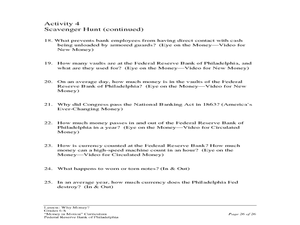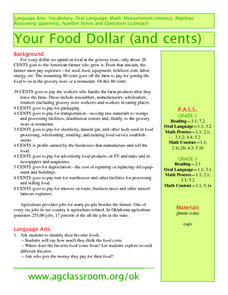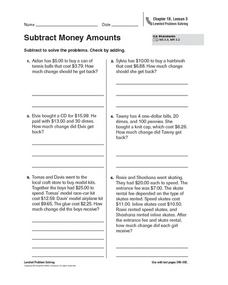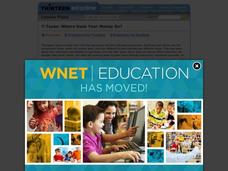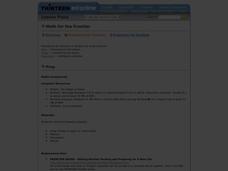Curated OER
Why Does Money Have Value?
Learners study money and its value and usage in the world today. In this economic lesson, students research money as they learn what it stands for, why it is important, how it is valued and what it represents in the United States.
Curated OER
Why Money?
Students participate in a trading simulation to learn about barter and the benefits of using money. In this barter lesson plan, students participate in a trading simulation and learn about coincidence of wants. Students then use money...
Curated OER
Count And Add Nickels
This math lesson focuses on coins - specifically the nickel. Students use plastic nickles in order to gain practice counting by fives, and adding amounts of cents. Students complete a worksheet where they tally up different amounts of...
Curated OER
Beyond the Checkbook: Choices of Payment Methods
Students explore different payment methods. In this math lesson, students discuss the difference between writing a check and paying online. They will compare and contrast and present their data to the class.
Curated OER
The Euro
Students investigate foreign currency. In this secondary mathematics lesson, students explore the reasons why the countries of the European Union switched to the euro. Additionally, students explore the possible reasons why Denmark,...
Curated OER
Problem Solving
Learners use hockey sticks to pick up bean bags and put them into hoops which they get money for in the end. In this movement and math lesson plan, students get fake money and add up how much they earned in the end based on how many...
Curated OER
Shopping with Money
Students apply their knowledge of addition and subtraction of money into real life situations.
Curated OER
Count Coins and Bills
Students study the names and values of different denominations of paper money, count sets of money that include both coins and bills. They complete a money chart, read and solve word problems.
Curated OER
Your Food Dollar (and Cents)
Young scholars examine where their food dollars go while recognizing coins and making change. They identify their favorite foods, receive one dollar, and take away amounts for each person involved in the production of their food dollar.
Curated OER
Making Good Money Choices
Student explore an economic-decision making model to decide where to donate money they have collected. In this philanthropic money lesson plan, students develop a plan for raising money and then decide how to best spend it for the most...
Curated OER
How Would You Spend a Million Dollars?
Learners plan and organize a theme to spend one million dollars. They select a theme, research prices of items on the Internet, organize the information into a spreadsheet, write an introductory paragraph, and create a final project.
Curated OER
Subtract Money Amounts
In this subtracting money amounts worksheet, students subtract the money amounts within the word problems. Students solve six word problems.
Curated OER
Taxes: Where Does Your Money Go?
Pupils study taxes and the role that they place in our lives. In this economic lesson, students explore the reality of taxes, how they work, why we pay them, where the money goes and how to make the most of the money you pay into taxes...
Curated OER
Place Value Lesson
Fourth graders use place value structure to construct and compare numbers that are up to the ten thousands. In this place value lesson plan, 4th graders explain and discuss numbers that are greatest in size according to the place of the...
Curated OER
Taxes: Where Does Your Money Go?
Young scholars explore the concept of taxes. In this tax lesson, students investigate types of taxes and deductions taken out of a paycheck before they see it. Young scholars calculate the tax on a given dollar amount. Students...
Curated OER
Multiply Money
In this multiplication practice worksheet, students sharpen their problem solving skills as they solve 6 story problems that require them to multiply money.
Curated OER
Ponzi? An April Fool's Day History and Economics Lesson Plan
Students explore the concept of a Ponzi Scheme. In this economics lesson, students invest in a product called Thin-Cups. Students invest money in this product over the course of a couple weeks. Students discover how a Ponzi Scheme works...
Curated OER
How Can Big Business Make Money From Tariffs?
Students explore the concept of the rise of big business in the United States. In this economics lesson, students investigate the impact of tariffs on businesses. Students also investigate the impact that incentives have on special...
Curated OER
Math for the Frontier
Students explore the concept of inflation. In this inflation lesson, students compile a list of necessities they would need to take with them if they were moving to a new state next month. Students compare their list with that of a...
Curated OER
Savings Account Introduction Lesson
This teaching tool promotes a practical understanding of basic mathematical skills by having learners determine percents on interest. There are several worksheet options available as well as a guid on how best to use them.
Discovery Education
Discovering Math: Beginning Measurement
Weight, time, length, cost, and mass are all things we can measure. Learners are introduced to the concepts they'll need to know before embarking on any measurement adventure. They are introduced to each type of measurement and types of...
Curated OER
Money Lessons That Cash In
Every child is fascinated by money. Teachers can use money lessons that expand on this inherent interest.
Curated OER
Money Matters - Teaching About Economics
The right money lesson plans can teach students about economics in an engaging way.
Curated OER
Problem Solving Using Coin Identity and Coin Value
Students identify characteristics of a penny, nickel, dime, and quarter, match the value of coins, and practice using money for a purchase.
Other popular searches
- Math Money Lessons
- Counting Money Math Lessons
- Autism Money Math Lessons
- Shopping Money Math Lessons
- Esl Lessons Maths Money
- Math Lessons With Money
- Math Lessons on Money
- Money Math Lessons for Life



